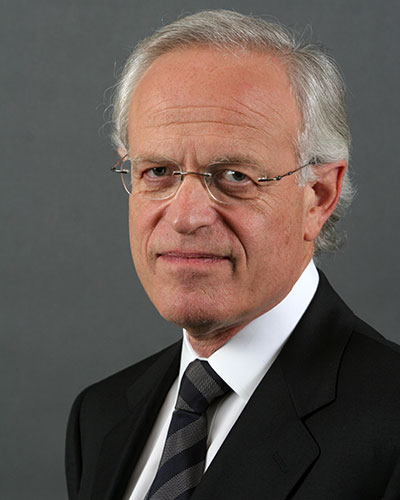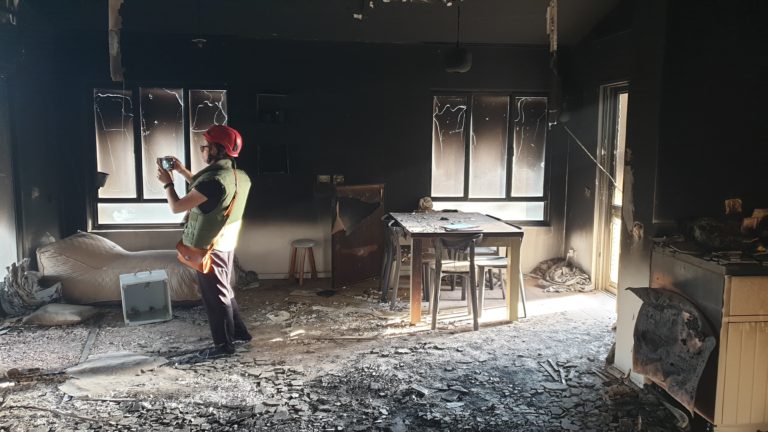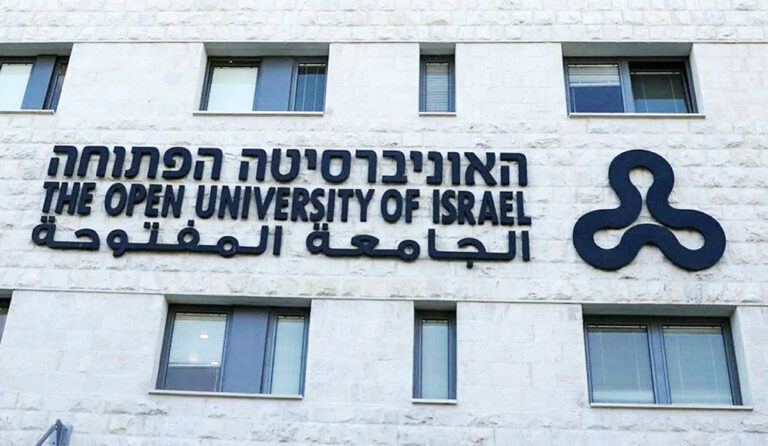Campus Out, Zoom In: The Coronavirus is Causing an Upheaval in the Academia That’s Here to Stay
Institutions of higher learning have transitioned at record speed to online learning, and there is understanding that this grand, global experiment taking place right now in online instruction will change the face of academia. Those that are most hurt by the changes are the fields which require labs and students who find it difficult to focus while at home.

Chairwoman Yaffa Zilbershatz and President of University of Haifa Ron Robin.
For years the universities have known that they must adapt to the modern age with more online-based studying. However, for both the institutions and the professors it has been convenient to continue in the way that they know, and the transition to digital was lagging. Now it has become necessary for the professors to learn these technologies; by the end of this crisis everybody will already know how to teach using Zoom. President of the Hebrew University, professor Asher Cohen explains that they increased from 30 to 3,000 online courses and, “There is no doubt we will finish this semester.” Also the Technion, University of Haifa, and the Open University had a surge in the number of online courses, and nearly all classes at these institutions are taking place from a distance.
“In my eyes, this is sort of a watershed moment,” says the Dean of Technological Instruction at the Open University, professor Oren Sofer. “I have no doubt that the universities will not return to how they once were,” agrees the Chairwoman of the Committee for Planning and Budgeting for Higher Education, professor Yafah Zilbershatz, “We will see the shift much quicker.”
It is still difficult to predict all the details of this transformation, however it is clear that after this crisis there will be many more recorded classes which will be uploaded to the internet, at the very least retroactively. “Even professors who opposed digital instruction will now agree to having their classes recorded,” evaluates the Dean of Undergraduate Studies in the Technion, professor Hossam Haick. One of the options being mentioned is that in some classes students will watch the class itself ahead of time, and will come to the classroom in order to ask questions and discuss. Sofer says it will be possible, “To create a cooperative environment in the style of Wikipedia in which students are answering questions together.” Another point being discussed is whether online learning can provide a solution for the controversy regarding Ultra-Orthodox and separation of gender.
A more general question is how the institutions will deal with exams. It is clear that the mid-semester point will arrive before the end of this crisis, and midterm exams will be replaced by midterm papers or at-home exams. Because final exams are still far away, the universities are allowing themselves to delay the challenge. The president of the Afeka Academic College of Engineering, professor Ami Moyal emphasizes that, “We are at a lack of other options with online studies, this cannot be a long-term solution for engineering.” He explains that a number of classes are very challenging and require a direct connection with the professors, in addition engineering today requires developing certain skills such as collaborative work, interpersonal relationships, and presentations.
One of the interesting questions is whether the institutions will now reveal that they can record a class one time and then replay it, without the need for professors, for instance with the presence of advisers only. The president of the University of Haifa, professor Ron Robin contends that it is impossible to do an entire degree online. “Creativity is formed when people look each other in the eyes and brainstorming occurs,” he says. Zilbershatz offers that, “it will be possible to utilize the campuses not only for instruction, but also for initiative and innovation,” meaning to use the physical space that will be made available, for instance for encouraging start-ups. She estimates that the online learning will create an opening for cooperative work between institutions, especially in the humanities field, where there is a serious lack of professors, which is expected only to increase. Robin surmises that the option to do some of the classes online will open up the universities to people who live further away and will decrease costs.
According to Robin, the main concern at the beginning of this crisis was that with seven universities and thirty academic colleges all learning online at the same time, the internet servers or video platforms would not be able to manage the burden. This crash never came. Robin tells that if there were problems it was merely for the professors themselves whose internet connection did not meet the demands.
To make it clear, professors are complaining about their difficulties learning to work the system. There are problems when carrying out a discussion, and the service has difficulties when trying to add videos into the class. Reports from academic colleges reveal classes that get stuck and the broadband transmission crashes. But it is reasonable to believe that these challenges can be overcome. A more acute issue is that students relay their difficulties in concentrating for long hours in online classes. And the building body of experience in the world does not seem encouraging in this manner. The results show that even for the most established, international distance learning platforms, the percentage of completion is around 10% or less
On the other hand, institutions of higher learning right now have two outstanding advantages. One is that the population is currently stuck inside in isolation on government orders. They report the presence of hundreds of students in introductory online courses, Robin reports high degrees of students’ excitement. On the other hand, the president of the Kinneret Academic College, professor Shimon Gepstein says that, “Students are expecting to return to routine, frontal style lessons as soon as possible,” because, “Human touch and interaction have no replacement.” The second advantage is that degree seeking students are required to muster self discipline. And yet, it is clear that staying home creates attention challenges. Moyal tells that, “They are doing chores in the middle. We see that they are cleaning their house during classes.
The only university relatively prepared for the transition to online studies was the Open University, for whom half of their classes occured in a digital fashion already before the current crisis. The Open University has 700 online courses and 47,000 students with the help of about 1,000 professors. In The Open University they emphasize that an online course is not just the lecture, every course has a website supplying it with additions of online and audio books, articles, and interactive assignments
Obviously, not everything can be done online, for example – lab time in the natural sciences or student experience teaching in a classroom. Moyal explains that all the computer lab work has been uploaded to the cloud and can be worked on from a distance. But really the only thing that institutions can do at the moment in terms of experiments in chemistry or electronics labs is to hope that by the end of the semester we see some calming of the restrictions.






